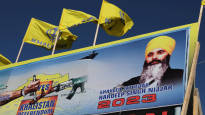Hardeep Singh Nijjar, who settled in Canada, spoke for the Sikhs’ own state. Canada is expected to provide substantial evidence to the allegations that India was involved in the assassination on Canadian soil.
45-year-old Hardeep Singh Nijjar was on June 18 on his way home from the Sikh temple he leads. Father’s Day pizza was waiting for him there. However, three masked men were waiting outside the temple outside Vancouver, Canada.
Nijjar was shot dead. No one has been arrested for the murder.
Nijjar’s death has created a diplomatic crisis between India and Canada.
The countries traditionally have a close relationship. There are 1.4 million people of Indian origin living in Canada, and most of them are Sikhs.
Nijjar spoke for a Sikh state of their own
Hardeep Singh Nijjar was born in the northern Indian state of Punjab. He immigrated to Canada in 1997 and became a citizen in 2007 in his thirties. He was married and the father of two children.
Nijjar ran a plumbing company in Canada, but he was also known as an advocate for the Sikhs’ own state. The state would be located in the Punjab region. The independence movement is banned in India.
In the Indian media, Najjri is unequivocally referred to as a terrorist. He is considered to be involved in several acts of terrorism, for example the bombing of a cinema in Punjab in 2007. Six people died and dozens were injured.
India believes that the independence movement is becoming active again
The Sikh separatist movement was at its strongest in the 1970s and 1980s. However, the Indian government crushed the movement in campaigns that left thousands dead.
The movement’s active insurgency is believed to have ended some time ago, but the Indian government has warned that attempts are being made to restart the movement. India has demanded, among others, Canada to block these intentions.
Najjir himself denied links to terrorism. According to the BBC he described himself as a Sikh nationalist who believes in Sikh self-determination and the independence of Punjab through a future referendum.
Around the time of the murder in June, Nijjar was organizing an informal referendum on the independence plan among Sikhs from India.
Supporters in Canada saw Nijjar as a religious leader peacefully pushing for a Sikh state, reports the BBC.
The Canadian Prime Minister’s speech plunged relations into a crisis
Canadian Prime Minister Justin Trudeau dropped a diplomatic bomb earlier this week when he spoke in the Canadian Parliament about India’s involvement in Najjir’s murder.
– We have credible suspicions about India’s involvement in the assassination in Canada, Prime Minister Justin Trudeau said in Parliament.
Canada bases its accusations on, among other things, intelligence information about the exchange of messages between Indian diplomats, says the Canadian Broadcasting Corporation.
However, no official evidence of India’s involvement has been presented.
Some of the information related to the murder has come to Canada from an intelligence group called Five Eyes, which includes the United States, Britain, Australia and New Zealand, reports The Financial Times.
Diplomats have been expelled
Both India and Canada have expelled diplomats over the crisis. India has suspended the issuance of Indian visas in Canada. Last year almost 300,000 Canadian tourists visited India.
The war of words is also heating up. Canada says some of its diplomats in India have received threats on social media.
India, on the other hand, has urged its citizens to be careful when traveling to Canada, saying there are “anti-Indian activities and politically sanctioned killings” in Canada.
India denies involvement in the murder
India denies allegations of involvement in Nijjar’s murder and has called Trudeau’s remarks absurd.
For years, India has accused Canada of being too soft on Sikh separatists. India has complained, for example, that Sikhs have been allowed to organize demonstrations for an independent state in Canada.
Negotiations of a trade agreement between the two countries are frozen.
Source: Reuters, AP
